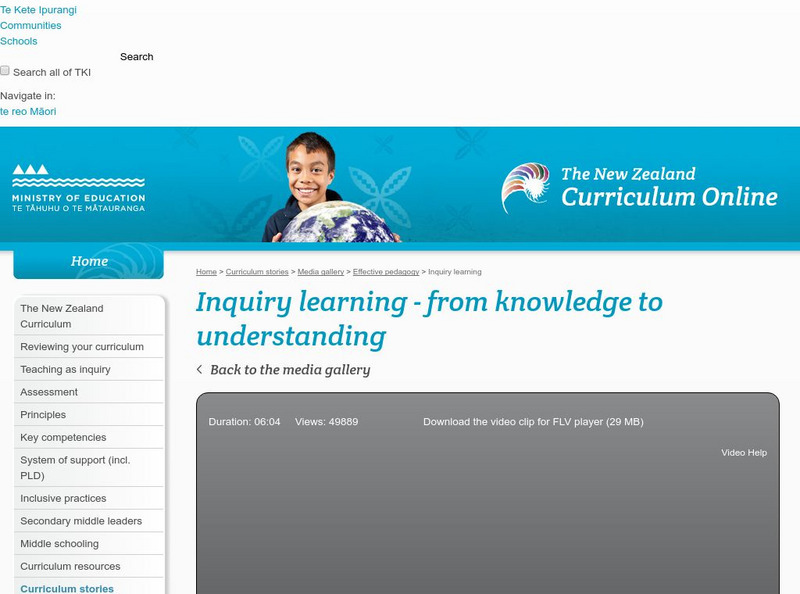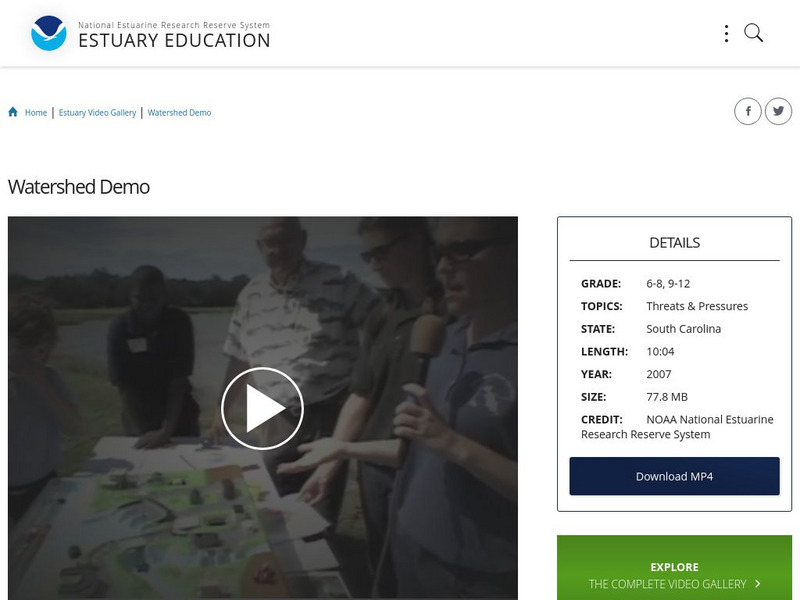Sprouts Learning
Project-Based Learning: How It Works and Why It’s So Effective
Project Based Learning, in short PBL, is a powerful way to learn new things and remember them for a long time. It describes a form of learning that happens as a result of solving actual problems.
PBS
Pbs Learning Media: Field Biology
This video segment from the teacher video series Learning That Works uses a case study to highlight the effectiveness of a project-based, real-world approach to teaching science. [6:11]
New Zealand Ministry of Education
Te Kete Ipurangi: Inquiry Learning From Knowledge to Understanding
How do you use inquiry learning to move from knowledge to understanding? Vic Hygate, from Windsor School in Christchurch, explains how she carefully focuses her planning, then uses events and provocative statements to make inquiry...
Edutopia
Edutopia: Kindergarten: Five Year Olds Pilot Their Own Project Based Learning
With this video, learn how kindergarten students can become active participants in project-based learning. Nine minutes, 1 second.
Edutopia
Edutopia: Project Based Learning: Using Today's Tools to Study Yesterday's
This video describes how a group of fifth-grade students learned about historical tools through the use of their technology, research and writing skills. Includes a discussion of a project-based learning field trip. 10 minutes, 4 seconds
Other
Responsible Subversives Network: Born to Learn
Born to Learn is the first animation in a fascinating series aimed to provide easy access to the exciting new discoveries constantly being made about how humans learn! Narrated by Damian Lewis.
Other
Ki Cubed: I Squared: A Different Way of Learning and Thinking
Imagine what students can accomplish in high school and beyond when they have been learning in a collaborative, real world, standards based environment throughout their elementary and middle school years! See what project-based learning...
Buck Institute
Buck Institute for Education: 21st Century Skills Culture
Students at High Tech High in San Diego, California use creative thinking and collaborative work to connect the classroom with the real world while developing 21st Century skills in mixed ability teams.
NOAA
Noaa: Estuary Education: Urban Estuaries: Water Quality Testing
Students measure water quality in the NY-NJ Estuary using simple tools. Scientists explain the importance of good water quality and talk about what causes water quality declines. [5:44]
NOAA
Noaa: Estuary Education: Watershed Demo
A quick, by necessity, discussion of watersheds with a great demo using a very good watershed model (Enviroscape) plus a couple of student tips. [10:04]
NOAA
Noaa: Estuary Education: Plants (Circle of Life)
A segment from the film Waters of Life takes a look at the role of plants in the estuary, and the cycle of life that depends on them. [3:27]
NOAA
Noaa: Estuary Education: Oyster Research
Learn about different research techniques used to study the oyster population in the estuary. [5:55]
NOAA
Noaa: Estuary Education: Hermit Crab Research
A young researcher studies how hermit crabs live and reproduce in the estuary. She also discusses the value of the Estuarine Research Reserve system. [4:57]
NOAA
Noaa: Estuary Education: Night in the Estuary
Come along on a night hike exploring the Rachel Carson Reserve in Beaufort, North Carolina. Duke University's Dan Rittshof, an expert on the estuarine environment, discusses the blue crab species. [4:22]
NOAA
Noaa: Estuary Education: Weather Forecasting Technology
Join an NOAA scientist and learn how the National Weather Service forecasts the weather. Find out how meteorologists rely on observations, computer models, and advanced technology when determining a forecast. [7:13]
NOAA
Noaa: Estuary Education: Extreme Weather: Path of Destruction
Learn how the National Weather Service uses technology to forecast extreme weather events and issue warnings to citizens in the path of destruction. [9:14]
NOAA
Noaa: Estuary Education: Weather Radio: Emergency Warning System
Go behind the scenes of the NOAA Weather Radio system. Learn how the system goes about issuing storm watches and warnings to the community when severe weather approaches. [3:53]
NOAA
Noaa: Estuary Education: To Be a Meteorologist
See an interview with a high school senior who wants to study to become a meteorologist. She is working with her local National Weather Service office to find out what she will need to do to realize her dream. [3:00]
NOAA
Noaa: Estuary Education: Horseshoe Crabs
A close-up look at the horseshoe crab, an ancient estuary animal. [10:14]
NOAA
Noaa: Estuary Education: Red Drum Data
Collecting data on the much-prized Red Drum fish using standard data collection techniques. [10:12]
NOAA
Noaa: Estuary Education: Research Vessel Tour
Take a tour of the research vessel, the RV Palmetto, and find out about life and work aboard a scientific research boat. [10:12]
NOAA
Noaa: Estuary Education: Tornado: View From the Past
Weather forecasting has advanced since this film was made (in about 1956). Compare forecasting methods shown in this film with modern techniques. Watch for a huge mistake in the way scientists thought about tornado safety fifty years...
NOAA
Noaa: Estuary Education: Estuary Scavenger Hunt
Follow this group of students through their scavenger hunt in the estuary. Take a look at the living and nonliving things that make this ecosystem a special place. [9:38]
NOAA
Noaa: Estuary Education: China Camp State Park
California's China Camp State Park is an important environmental and historic site which has a natural watershed along the shores of San Francisco Bay. Features in the estuary include an extensive intertidal salt marsh, meadow, and oak...























